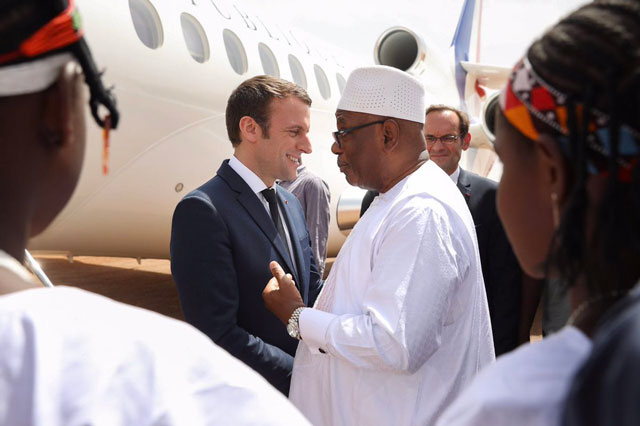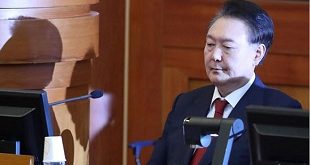
Ouagadougou, Burkina Faso | AFP | President Emmanuel Macron kicked off his maiden African tour Tuesday by vowing to declassify secret French files on Burkina Faso’s assassinated leader, Thomas Sankara, hailed as a hero in much of the continent.
The terror threat has cast a shadow over Macron’s swing through West Africa, with three civilians wounded in an attempted grenade attack on French troops in Ouagadougou, the Burkinabe capital, shortly before his arrival late Monday.
“Two hooded individuals on a motorcycle threw a grenade towards a French army vehicle” as it made its way to a barracks housing French special forces, a security source told AFP on condition of anonymity.
The three-day trip aims to boost France’s influence in West Africa, taking Macron from Burkina Faso — bearing the brunt of jihadist attacks in the Sahel — to a European-African summit in Ivory Coast and finally to Ghana, a former British colony.
After meeting Burkinabe President Roch Marc Christian Kabore, Macron touched on one of the country’s greatest traumas — the killing of its revered leader Sankara, 30 years ago.
– ‘Africa’s Che Guevara’ –
“At present, except for documents which are classified and categorised as secret, the files are available and open to Burkinabe justice,” Macron said.
“I have made a clear undertaking and I have just told President Kabore: these documents will now be declassified for Burkinabe justice, which will have access to all the documents on the Sankara affair.”
Sankara, a charismatic young army captain dubbed “Africa’s Che Guevara”, was cut down in a hail of bullets on October 15, 1987 on his way to a special cabinet meeting.
Many Burkinabe today suspect that France played a role in the putsch which brought Sankara’s close friend Blaise Compaore to power.
Compaore went on to rule Burkina Faso with a rod of iron until October 2014, when he was ousted by a popular uprising.
About a dozen people have been charged in connection with Sankara’s assassination including soldiers from the presidential security unit.
Compaore, who is in exile in Ivory Coast, is the subject of an international arrest warrant over the killing.
– Colonial crimes ‘indisputable’ –
But his visit has stirred up some protest, with demonstrators erecting a barricade and burning tyres on a road leading to Ougadougou University where Macron was to give a speech, prompting the deployment of riot police.
Macron’s visit has sparked criticism on social media in this former French colony, notably over the lucrative contracts French companies sweep up in the region as well as of Paris’ historical support for African autocrats.
In his speech, Macron was quick to address the scars of the colonial period, saying “the crimes of European colonisation are indisputable,” but insisting it was “a past which has to pass.”
But he also looked to the future, saying African was facing a challenge “that we cannot escape, that of demography”, he said.
“When you have demographic growth which consistently outpaces economic growth, you will never manage to fight poverty,” he said. “Not talking about this is irresponsible.”
Several months ago, Macron came under fire over a speech on demographic, democratic and security challenges in Africa in which he said the continent had “civilisational” problems in which he flagged the fact that women had “seven or eight children”.
– Migration and security –
Macron’s advisers say his main message is to stress a partnership of equals with Africa, based on education and entrepreneurship.
But regional security concerns will also be discussed at a summit of the European Union and African Union on Wednesday and Thursday that will bring together over 80 leaders from the two continents.
European leaders are desperate to stem the flow of African migrants across the Mediterranean without leaving them at the mercy of traffickers in transit countries such as Libya, where they face torture, rape and being sold into slavery.
Macron will also seek international backing for a five-nation African counter-terror force which France hopes can eventually take over the fight against jihadist groups in the Sahel region.
Ouagadougou has suffered two recent Islamist terror attacks — a shooting spree in January 2016 that left 20 dead and a similar assault by gunmen in August that killed 19.
French special forces have been present in the country since 2010 to help regional governments tackle jihadist violence in the Sahel, particularly in neighbouring Mali.
 The Independent Uganda: You get the Truth we Pay the Price
The Independent Uganda: You get the Truth we Pay the Price



